Gold Stocks Back in the Volatility Saddle Again
Commodities / Gold and Silver Stocks 2018 Jun 01, 2018 - 12:47 PM GMTBy: The_Gold_Report
 Precious metals expert Michael Ballanger dissects his volatility trades.
Precious metals expert Michael Ballanger dissects his volatility trades.
One week ago today, I made the following commentary:
"Finally, I am officially revisiting the "volatility trade" (VIX: CBOE Volatililty Index) but unlike February where I used the UVXY (ProShares Trust Ultra VIX Short) as my proxy for the increase in volatility, I am using the TVIX (VelocityShares Daily 2X VIX ST ETN) because it is a double leverage ETF for the VIX but has better leverage than the UVXY. UVXY used to be a triple-leverage play on volatility but the slippage due to its dependence on futures became too difficult to navigate and they cut the leverage from 3:1 to 2:1. I had a 250% gain on this in February but gave back 9.84% in April. I am long 50% of the TVIX position from yesterday at $4.95 and am using the opening this morning to add another 25% in the $5.25 range. I will again use a 10% stop-loss but since the 52-week low is $4.60, that will be the exit level. Upside target will be $8.00 remembering of course that the 52-week high was $26.56.
The month of May is rapidly coming to a close, which starts what is historically the worst six months of the year. With the situations in Turkey and Italy worsening, with the North Korean summit in question, central banks engaged in "quantitative tightening," rising oil prices, and the possibility that the China-U.S. trade talks go south, markets are going to be in peril as summer illiquidity arrives. For this reason, gold "should" be the go-to asset, but I am banking on volatility rather than gold as the preferred method of riding the correction."
In the Monday overnight session, the words "panic," "contagion," and "implosion" were being bandied about while the S&P futures were off sharply when I arrived at the gym yesterday at 7:00 a.m. Sure enough, gold and silver did not respond to the developing crisis in Europe because U.S. dollar strength is significantly more important to gold demand than Italy and Spain vaporizing in front of our very eyes.
Monetary panic doesn't throw the slightest of bids into the precious metals any more because they can simply buy the VIX as a hedge because gambling on a piece of financially engineered paper like the VIX ETFs is infinitely more sensible than owning a monetary metal with 5,000 years of well-earned legacy as a preserver of wealth. The huge sell-off in gold initially in response to the currency swing was reversed in the Tuesday afternoon session and what was a $12.30 loss became a slight positive by 2:00 p.m. The chart below of the VIX index shows a gap on January 29, which precluded the moonshot to $49.21 a week later. Since I have been accumulating the TVIX under $5.00 all last week and on Monday, Tuesday's 38.2% move in the VIX Index was accompanied by a 25.5% move in the TVIX. While our $8.00 target seems a tad conservative given the move in February to $26.56, I have grown to appreciate base hits and doubles over home runs lately, which might be a function of my age or pondering last year's capital gains/losses report completed last month.
Wednesday's 38-point rebound in the S&P 500 caused the VIX to give back 13.69% and the TVIX to give back 9.1%, but I continue to gather in "VOL" on dips because those two gaps in January and againTuesday day may be indicative of a violent return of the type of action that allows for a 250% return in eight days as we experienced back in very early February. Furthermore, to have a 32-point decline followed the very next day with a 35-point rebound followed by today's 18-point drop is classic volatility, and that is not the type of stock market behavior that instills investor confidence.
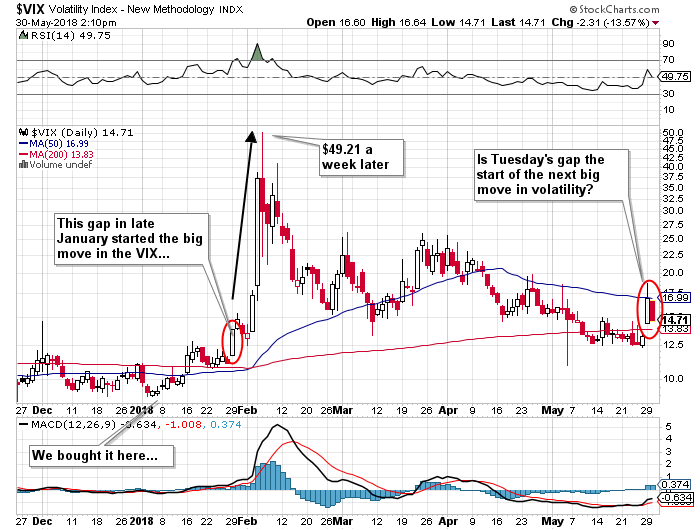
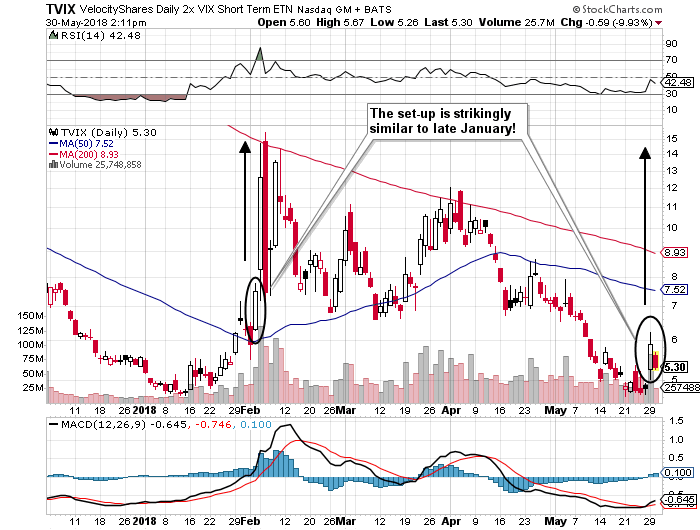
The next big story and one which is being underplayed by the financial media is the current debacle called Deutsche Bank (DB:US), which this morning took out the lows of September 2016 and is now resembling a company in severe duress. I did a quick scan of headlines for DB over the past five years and notwithstanding that DB holds the largest derivatives book on the globe, this bank has been infested with numerous problems over the last few years. Mortgage fraud, gold manipulation, Libor fraud and now massive layoffs would imply that all is not well with this behemoth that truly is the ultimate in "Too Big to Fail" financial institutions. The leverage they carry representing sovereign debt positions would create a counterparty contagion the likes of which would make the 2007–2008 subprime crisis look like May Day picnic. The fact that they are the one bullion bank most responsible for the overt and unsanctioned shenanigans in gold and silver makes their current woes doubly satisfying for metals buffs like us, but you must realize that having Deutsche Bank implode would send shock waves through all of our markets triggering gargantuan liquidity squeezes, which means that long positions in everything would be thrown overboard in order to reduce the leverage that is keeping these markets afloat. This is again why I see the volatility trade as the best method of protecting one's wealth given the vacuous moves by the Trump administration to impose tariffs on Mexico, Canada and the Eurozone.
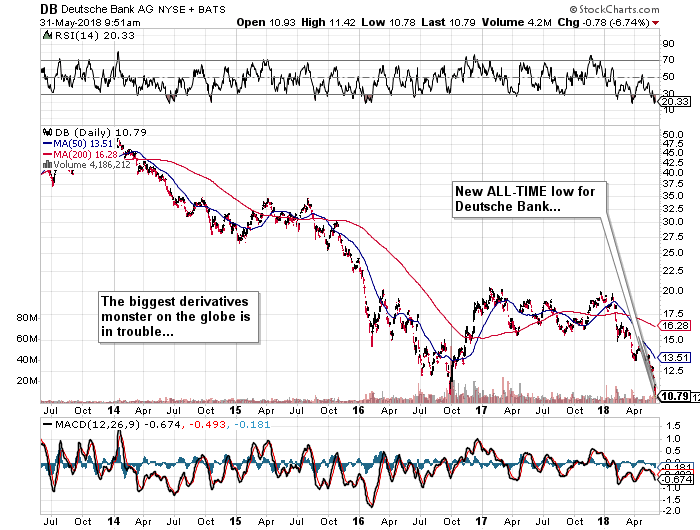
Interestingly, the only way to judge the collective risk appetite of the junior resource sector is to glance (if you can stomach it) at a chart of the TSX Venture Exchange (CDNX) which, after reclaiming the 800-level back in April, has once again succumbed to seasonal weakness and is threatening to take out the April low around 754. Every year, I always make a vow to reduce my exposure to zero by the end of March with a view to buying back my favorite TSX.V juniors between mid-August and Labor Day and every June I wind up kicking myself in my own backside for failing to listen in earnest to my own wise counsel. There are isolated pockets of strength out there but they are invariably found in "story stocks" and usually related to something other than gold or silver or exploration issues. It is truly incredible to look back at a chart of the TSX.V from 2001 to 2007 and to recall the moves we enjoyed in the Senior Golds (GDX) and even greater gains in the Junior Golds (GDXJ). Even after the Financial Crisis and meltdown in 2007–2008, the rebound in the TSX.V from the Crash lows of late 2008 at 666 saw a number of exploration issues perform exceedingly well even though the TSX.V could only rally to two-thirds of its 2007 peak.
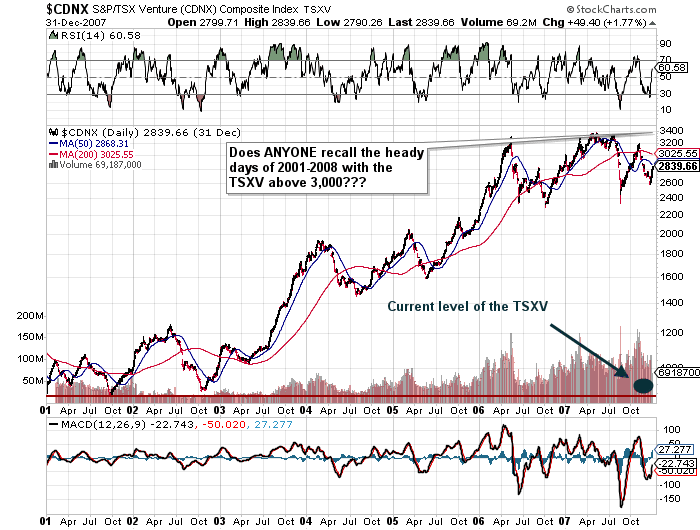
TSX Venture 2001-2008
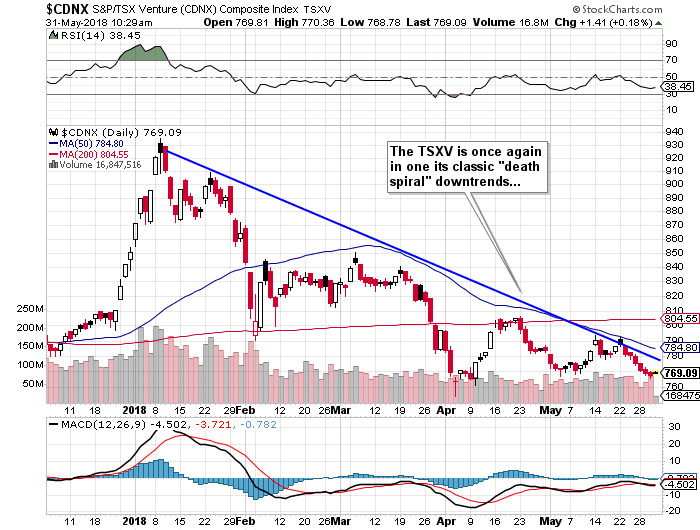
TSX Venture today
So why do I feel it necessary to remind us all of just how LOUSY the juniors have acted since 2011? It is because of charts like this one shown below, which is that of Novo Resources Corp. (NVO.V) whose Karratha gold project in the western part of Australia has been compared to the mighty Witwatersrand region of South Africa. A few months back in October I made this remark regarding NVO: "I sincerely hope that the all of this pseudo-scientific analysis surrounding these so called "Witwatersrand characteristics" have not replaced actual drilling or (better still) bulk sample results as justification for owning the stock."
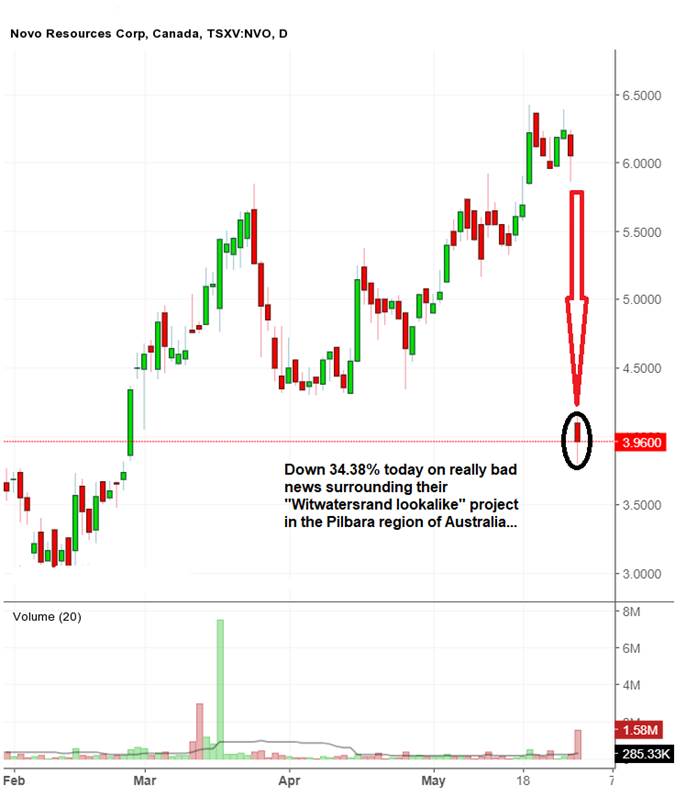
The stock peaked in October 2017 at around $8.50, and after I had finished reading all of the reports on the exploration merits of the Pilbara region, I concluded that it was about as close to a perfect "story" as could ever be written. In fact, it was such a good story that it brought to mind the words of a famous mining promoter from the 1970s who coined the phrase "Why ruin a great property by drilling it?" Falling squarely into the category of "You just can't make this sh1t up!," to compare this as yet untested region to the Witwatersrand is analogous to comparing Mark's Work Warehouse to Amazon. The Witwatersrand has produced over 1.7 billion ounces of gold since the initial discovery in 1886. At today's gold price, that is $2,292,160,000,000 (U.S.) worth of metal so it is quite easy to see how NVO.V could command a speculative market cap of over $1.3 billion with that kind of upside potential being used as a financial divining rod.
Now, I am not casting any negative dispersion on the Pilbara play or any of the people behind it. I am simply pointing out that when the little green monster called "Baron von Greed" arrives at your door, you better be careful because when the Bre-X fraud was revealed in April 1997, it took five years and billions of dollars of lost value to heal things up. For the sake of the junior mining market, I have been rooting for the Pilbara play NOT because I am a shareholder in NVO; I am actually praying for it because I am a shareholder in the same sector. If investors wind up on the scrap heap of failed dreams because the bulk sample results showed distinctly un-Witwatersrandian characteristics, it hurts all of us as if we had owned it at $8.50.
Today's drop in the Pilbara stocks included Pacton Gold (PAC.V), which was $0.05 last November and which traded up to $1.02 on Monday and which sits at $0.49 today, down 42% on the day and less than half of the 52-week high. I mention this as a living example of how being associated with a "story stock" can be a double-edged sword with lethal consequences once the speculative bloom is off the proverbial rose.
What is actually needed this summer is a major new exploration discovery in a friendly jurisdiction (like Nevada) where assay results reveal a wide intercept of high-grade rock in a previously untested area that gives rise to a massive land rush with massive dollars moving to acquire ground. It happened in northwest Ontario in 1981 (Hemlo); it happened in Canada's Northwest Territories in 1991 (Dia Met/Ekati); and it happened more recently (2009) in the Yukon after Underworld announced a discovery at Golden Saddle and was eventually acquired by Kinross. What gave those areas plays credibility was the arrival of the majors by way of investments in the junior discovery names. Lac Minerals moved in early at Hemlo; BHP Billiton and RTZ arrived very early in the NWT and Dia Met; and as mentioned, Kinross lit things up by taking out Underworld. So, when you look at the Pilbara play, there is no presence (that I am aware of) of any majors other than the investment made by Kirkland Lake Gold through private placement in NVO and while Kirkland Lake Gold is a fine company, it is no BHP.
As a final note, all Pilbara investors should remember that in 1994, there was a severe correction in the Canadian diamond explorers (including Dia Met and Aber) when Kennecott revealed that a bulk sample taken from one of the kimberlite pipes had proved barren after the junior JV partner, DHK Diamonds, had reported significantly higher grades. After the massive sell-off in all of the exploration juniors nearly crippled the area play, it eventually turned out to be a false alarm because BHP bought out Dia Met and fortunes were eventually made in Dia Met, Aber and Mountain Province. Perhaps today's panic attack in NVO and its brethren will prove to be a similar false alarm.
I wrap up with today's missive with two charts representing the two hottest sectors of the Canadian markets as measured by speculative interest. I showed you all back in December how the introduction of Bitcoin futures on the CME was the lasso used by the bankers to reel in BTC. Within literally days of that event, BTC topped out and now resides at a mere 38% of its December 2017 peak. Cannabis stocks are led by Canopy Growth, which was the first shot out of the decriminalization cannon and is the poster child for the Canadian medical marijuana industry, hence the stock symbol W-E-E-D. The mania in the Canadian crypto-deals fell off a cliff here in 2018 with massive losses turning up everywhere on the Street. I have the distinct feeling that based upon the number of marijuana stories out there and based upon WEED's $7 billion market cap, Canadian marijuana deals might be ripe for a crypto-crack-up any time now.

One way or another, whether it is Tesla or Bitcoin or Novo or WEED, these "story stocks" are elevated in a cloud of hopium and greed, and since they represent the heart of the speculative market mindset, owning a smidgeon of "volatility" through the TVIX does not appear to be an imprudent move.
Originally trained during the inflationary 1970s, Michael Ballanger is a graduate of Saint Louis University where he earned a Bachelor of Science in finance and a Bachelor of Art in marketing before completing post-graduate work at the Wharton School of Finance. With more than 30 years of experience as a junior mining and exploration specialist, as well as a solid background in corporate finance, Ballanger's adherence to the concept of "Hard Assets" allows him to focus the practice on selecting opportunities in the global resource sector with emphasis on the precious metals exploration and development sector. Ballanger takes great pleasure in visiting mineral properties around the globe in the never-ending hunt for early-stage opportunities.
Disclosure:
1) Michael J. Ballanger: I, or members of my immediate household or family, own shares of the following companies mentioned in this article: None. I personally am, or members of my immediate household or family are, paid by the following companies mentioned in this article: None. My company has a financial relationship with the following companies referred to in this article: None. I determined which companies would be included in this article based on my research and understanding of the sector. Additional disclosures are below.
2) The following companies mentioned in this article are billboard sponsors of Streetwise Reports: None. Click here for important disclosures about sponsor fees. The information provided above is for informational purposes only and is not a recommendation to buy or sell any security.
3) Statements and opinions expressed are the opinions of the author and not of Streetwise Reports or its officers. The author is wholly responsible for the validity of the statements. The author was not paid by Streetwise Reports for this article. Streetwise Reports was not paid by the author to publish or syndicate this article. Streetwise Reports requires contributing authors to disclose any shareholdings in, or economic relationships with, companies that they write about. Streetwise Reports relies upon the authors to accurately provide this information and Streetwise Reports has no means of verifying its accuracy.
4) This article does not constitute investment advice. Each reader is encouraged to consult with his or her individual financial professional and any action a reader takes as a result of information presented here is his or her own responsibility. By opening this page, each reader accepts and agrees to Streetwise Reports' terms of use and full legal disclaimer. This article is not a solicitation for investment. Streetwise Reports does not render general or specific investment advice and the information on Streetwise Reports should not be considered a recommendation to buy or sell any security. Streetwise Reports does not endorse or recommend the business, products, services or securities of any company mentioned on Streetwise Reports.
5) From time to time, Streetwise Reports LLC and its directors, officers, employees or members of their families, as well as persons interviewed for articles and interviews on the site, may have a long or short position in securities mentioned. Directors, officers, employees or members of their immediate families are prohibited from making purchases and/or sales of those securities in the open market or otherwise from the time of the interview or the decision to write an article, until one week after the publication of the interview or article.
Michael Ballanger Disclaimer:
This letter makes no guarantee or warranty on the accuracy or completeness of the data provided. Nothing contained herein is intended or shall be deemed to be investment advice, implied or otherwise. This letter represents my views and replicates trades that I am making but nothing more than that. Always consult your registered advisor to assist you with your investments. I accept no liability for any loss arising from the use of the data contained on this letter. Options and junior mining stocks contain a high level of risk that may result in the loss of part or all invested capital and therefore are suitable for experienced and professional investors and traders only. One should be familiar with the risks involved in junior mining and options trading and we recommend consulting a financial adviser if you feel you do not understand the risks involved.
© 2005-2022 http://www.MarketOracle.co.uk - The Market Oracle is a FREE Daily Financial Markets Analysis & Forecasting online publication.



